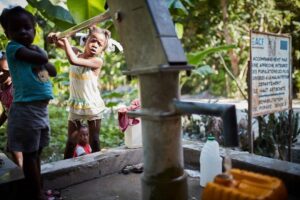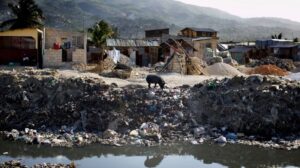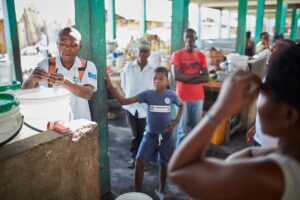Access to safe water in Haiti is an unachievable dream
People of Haiti often bear the burden of walking miles every day to find water in streams and ponds. Waterborne diseases and no access to safe water is robbing the futures of Haiti’s citizens.
23rd of March 2021

Haiti: People of Haiti often bear the burden of walking miles every day to find water in streams and ponds. Waterborne diseases and no access to safe water is robbing the futures of Haiti’s citizens.
United Nation’s objective of global access to clean and safe water, sanitation and hygiene, also known as WASH, is unachievable in the Caribbean country Haiti.

Surveys revealed, In the capital city of Port-au-Prince, millions of people have no reliable water supply. Many public water booths are dry, and no sign of water is anticipated.
Regularly people are struggling for water. As cholera has invaded Haiti and safe drinking water has become Haiti’s most immediate public health problem.
Reason for Water Crisis in Haiti
The world is celebrating World Water Day, but there are still 2.2 billion people who have “no access to safe water.”
The survey disclosed, “Haiti is the most underserved nation in the Western Hemisphere in terms of water and hygiene infrastructure.”
Waterborne diseases cause more than half of the deaths in the nation annually. According to the sources, the 2010 earthquake has displaced more than a million individuals, influencing the largest cholera outbreak in the world’s history.

Earthquakes caused damage to wells and water regularities, which are a significant reservoir of fresh water for Haiti’s population. Through the fixing of these wells, The Water Project and Living Water International have provided thousands of individual access to safe and clean water.
After the damage caused by the earthquake in Haiti, the administration’s attempt to build back new water systems and urination and defecation. However, lack of proper drainage arrangements, the toilet waters are responsible for more unhygienic conditions resulting in several diseases.
Within these circumstances, Action Against Hunger and other construction organizations experimented by shifting from free allowances of WASH products to a market-based program to enhance the viability of potential solutions in Haiti.
Aquatabs and Liquid Chlorine
For Example, in Haiti’s largest region, Artibonite, sources found that only 34 percent of rural households were treating their water to make it viable for drinking, which realistically was closer to 5 to 10 percent of safe water but not safe water.

Aquatabs (world’s no.1 water purification tablets) and liquid chlorine were available in Haiti’s local markets; in emergencies, there is a free distribution of Aquatabs, whereas, for liquid chlorine, they had to pay a price of struggle and capital cost both.
Moreover, liquid chlorine is locally generated, whereas Aquatabs are shipped overseas, making it a more sustainable resolution.
Development in Haiti
President Joevenel Moise is working tirelessly to solve the disputes of Haiti; 24/7 electricity, 24/24 power supply, no crime-rates, and access to the internet are his significant objectives.

But the immediate access to safe water is yet incomplete and uncovered from the people of Haiti. Caribbean countries like Dominica is blessed with 365 rivers that supply potable water and an ample supply of freshwater to citizens and residents.
More countries that lack access to safe water
On the other hand, Ethiopia (Almost 60 percent of the population lacks primary access to drinking water), Papua New Guinea, The Republic of Chad, Uganda, the Democratic Republic of the Congo, Mozambique, The United Republic of Tanzania and Somalia their situation of access to drinking water is worse than Haiti.
Latest
- Two Kittitian Youths to begin Technical Training in Germany under PM Drew’s International Skills Initiative
-
Ferry capsizes off Bali Coast: 4 Dead, Dozens missing after Vessel sinks in Rough Waters -
BTS announces comeback with new album and world tour in 2026 -
St Kitts and Nevis: PM Drew joins African President Tinubu for historic state visit and Parliamentary session -
Grenada: Explosion in Telescope destroys homes and injures several people
Related Articles



2nd of July 2025





